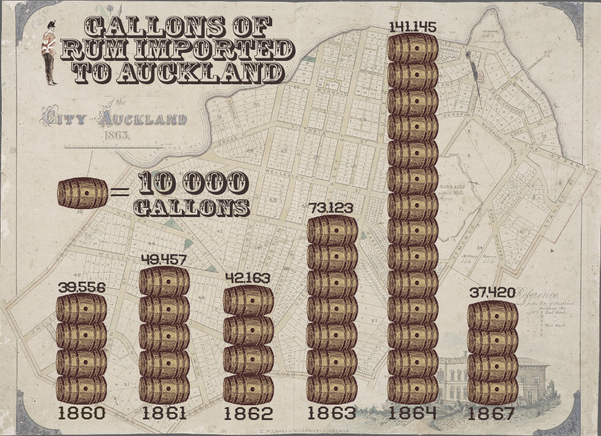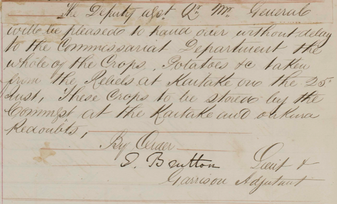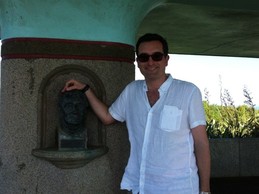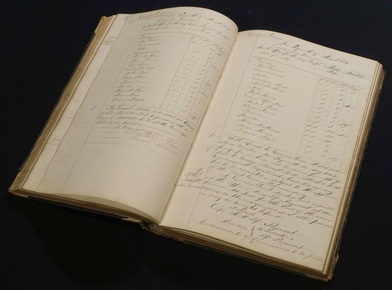SOLDIERS OF EMPIRE
|
The 1860s wars were battles of economies as well as of weapons. Keeping soldiers fed and adequately supplied involved huge expenditure. Troops fighting for the Crown were supported by the Imperial Treasury and resources of the colonial government while Maori were sustaining livelihoods, crops and stock at the same time as campaigning. Over the 2015/16 summer Angus Crowe worked on a Summer Scholarship investigating the scale and economic impact of provisioning the thousands of British soldiers stationed in New Zealand.  Quantity of rum imported to Auckland between 1860 and 1867. Rum imports increased by 185.39% between 1861 and 1864. Data from 'Statistics of New Zealand, 1860–67', Statistics New Zealand. Quantity of rum imported to Auckland between 1860 and 1867. Rum imports increased by 185.39% between 1861 and 1864. Data from 'Statistics of New Zealand, 1860–67', Statistics New Zealand. Each man was entitled to 1 pound of bread (around half a kilo), 1 pound of fresh meat and a quarter pint of rum per day. Supplying these rations meant big business. Auckland’s economy boomed with huge spikes in the quantities of supplies landed and traded. Cattle, wheat and rum came in from New South Wales and Victoria, and further afield. Local merchants vied for lucrative contracts from the Commissariat; bakers and butchers had their hands full. Rivalry and rumour as to who got the best price was rife. And in the field, men complained often about the quality and quantity of food they received. Getting food supplies from Auckland wharves to inland redoubts and camps was also a major undertaking. In the StoryMaps that follow Angus has provided an overview of ‘the stomach at war’. ‘The role of the Commissariat during the Waikato Campaign, 1863 – 1864’ contains links to full statistical tables of some of the economic patterns in evidence in wartime New Zealand of the 1860s. When the majority of British troops departed in 1866 Auckland fell into sharp economic recession.
1 Comment
Everything from the most mundane to the exceptional feature in the army record. A unique perspective on the day-to-day conduct of war can be found in the 1864 Garrison Order Book held in Puke Ariki’s research collection. (ARC2002-811) Over the summer Samantha Hunt, a Summer Scholar co-funded by Puke Ariki and Victoria University worked her way through the Marsland Hill barracks Garrison Order Book – all 456 of its large pages. Covering the period 8 January to 18 October 1864, the Book details the movements and activities of men serving with the 57th and 70th regiments, the Taranaki Militia and Military settler volunteers. Samantha created an index to the Book listing people, events and topics. The index enables greater access to the Book’s extensive contents.  The format of the Order Book is consistent: each daily entry begins with the date, duty officers for the day and a table recording the guard and picquet placement at the numerous outposts through the region. This is followed by the daily garrison and general orders, which is where we have a window onto the conduct of the conflict. The work of the garrison can be seen for example in the order issued on 27 March 1864 noting that “The Deputy asst. [Quarter Master] General will be pleased to hand over without delay to the [Commissariat] Department the whole of the Crops, Potatoes etc. taken from the Rebels at Kaitake on the 25th Inst, these crops to be stored by the [Commissariat] at the Kaitake and Oakura Redoubts, By Order S Brutton, Lieut. + Garrison Adjutant”. As well as indexing the Order Book Samantha produced an array of short accounts for a popular readership featuring significant events and themes from entries in the Book. These provide a view of garrison life in the raw. They are available on the Puke Ariki website. A recurring theme throughout was alcohol and problems arising from its consumption. The order book begins with a note that “A Board of Officers will assemble at the [Commissariat] Store at 11am tomorrow for the purpose of testing the quality of some Rum offered for the use of the troops” – a most important duty! Tēnā koutou, welcome to the blog for Tinker, Tailor, Soldier, Settler – our research project on garrison and empire in the nineteenth century. Here we’ll be sharing discoveries from the archives, stories from our networks, and news of what is going on in the project. Summer progressThe summer months have seen work on 4 strands of the project. We have gone ahead in leaps and bounds with the wonderful work of 3 VUW Summer Scholars and a summer research assistant. More on these strands in future posts, but in short: Fiona Cliff has been making connections between men who served in Crimea, India, and in New Zealand; Samantha Hunt has been busily indexing and analysing the New Plymouth Garrison Order book for January to October 1864 at Puke Ariki; John McLellan has been transcribing the 1863-1864 diary of Ensign Spencer Perceval T. Nicholl and developing it into a digital narrative at the Alexander Turnbull Library; and Angus Crowe has been investigating bread, meat and rum and the economic impact of the war in the early 1860s. Rebecca spent much of February transcribing WO100/18 files – War Office files recording who received the New Zealand Medal. With just a few regiments left to go we’re almost in possession of a list of the 12,000 or so men who served with the imperial regiments in the 1860s. Charlotte worked across all aspects of the project over the summer. She spoke at the Wellington Branch of the New Zealand Society of Genealogists at the end of January, and with Samantha Hunt at Puke Ariki in New Plymouth at the end of February. Two of her articles appeared in the latest issues of the Journal of New Zealand Literature: ‘The First World War and the Making of Colonial Memory’ (33:2), and Law & History. Journal of the Australian and New Zealand Law & History Society: ‘People of the Land, Voting Citizens in the Nation, Subjects of the Crown’ (2015: 2). Charlotte and Rebecca presented papers at the New Zealand Historical Association Conference at the University of Canterbury in early December 2015 in a session ‘Rethinking New Zealand in the ‘redcoat’ empire. A visitor via the Peninsula War Huw and the Duke of Wellington, Wellington, New Zealand. Huw and the Duke of Wellington, Wellington, New Zealand. Dr Huw Davies, (Defence Studies, Kings College London) dropped by for a visit on 7 and 8 February. A scholar of, among other things, the Wellington our Wellington is named after, Huw had been in Sydney and Canberra for research and the ‘New Directions in War and History’ conference. He made a detour to see us in Wellington, arriving at our offices via the Peninsula War (or, at least, Talavera, Clifton, and Salamanca on the Wellington Cable Car). His research focuses on 19th and 20th century warfare and in particular on military thinking, innovation, knowledge transfer and networks, so our several hours of discussion on various topics passed by all too quickly. Huw contributes to ‘Defence-in-Depth’, the research blog of the Defence Studies Department, King’s College London, and you can see his post about his trip Down Under here. |
Archives
April 2022
Categories
All
|
Banner image: Detail of Breech loading rifle, Snider action, made by the Royal Small Arms Factory, Enfield, England, 1861. Calibre .577, Museum of New Zealand, Te Papa Tongarewa, DM000046
Favicon image: Thomas Matravers album, Sir George Grey Special Collections, 3-137-26d, Auckland Libraries
Favicon image: Thomas Matravers album, Sir George Grey Special Collections, 3-137-26d, Auckland Libraries
Copyright © 2021

 RSS Feed
RSS Feed